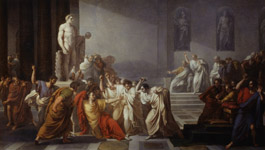1. Athenian Revolution, 508 BC
Protecting democracy for posterity
A Spartan army invaded Athens to clamp down on its budding democracy. But the people rose up and blockaded the Spartans on the Acropolis. The Spartans gave up after two days without supplies and negotiated their way out of town. Athens became thoroughly democratic, inspiring scores of nations to follow suit.
2. Theban Revolt, 378 BC
Spartan militarism is no match for guile
Thirty-five years after Sparta defeated Athens in the Peloponnesian War, a small oligarchy ruled the once proud city of Thebes, with 1,500 Spartan soldiers to support it. Then, seven Theban conspirators dressed like women infiltrated a party of the rulers and stabbed them to death. The revolution that followed made Thebes a democracy and led to the defeat of the Spartan army at the Battle of Leuctra in 371 BC. Thebes’s glory days were short-lived, but Sparta never recovered.
3. Spartacus’s Slave Rebellion, 73–71 BC
Demonstrating the power of revolt
A slave, gladiator, and former allied soldier in the Roman army, Spartacus stirred up a slave revolt in Italy that raised some 60,000 soldiers and defeated nine Roman armies before it was put down. Contrary to myth, Spartacus did not abolish slavery, but he did contribute to the sense of insecurity that made many Romans prefer rule by a dictator to the free but indecisive republic.
4. Caesar’s Murder, 44 BC
Killing off the Roman Republic
When senators stabbed Julius Caesar to death on March 15, they thought they had saved the Roman Republic. Caesar had won a civil war, become dictator for life, and flirted with making himself king. His assassins called themselves “liberators,” but failed to win popular support and were defeated at the Battle of Philippi in 42 BC. A dozen years later the Republic came to an end, proof that a despot may be preferable to a power vacuum.
5. Boudicca’s Revolt, AD 60–61
A woman warrior inspires British nationalism
Wife of a British king who was an ally of Rome, Boudicca was brutally mistreated upon the king’s death and started a revolt. Her soldiers defeated a Roman legion and destroyed three cities, including London, before she was herself defeated. She was never captured; she either committed suicide or died of illness. In modern times, Boudicca became a symbol of resolve against the odds in such modern conflicts as the Battle of Britain.
6. Jewish Revolt, AD 66–70
The destruction of the temple in Jerusalem
The first of three failed Jewish uprisings against Rome, the Jewish Revolt led to massive civilian death and the destruction of the Temple in Jerusalem (AD 70) as well as to the capture of the fortress Masada (AD 73). The revolt’s outcome spurred a movement that eventually led to the writing of the Talmud and drove a wedge between early Christianity and Judaism.
MHQ contributing editor Barry Strauss, author of The Spartacus War, teaches History at Cornell University. He is currently writing a book on Alexander the Great, Hannibal, and Caesar.


